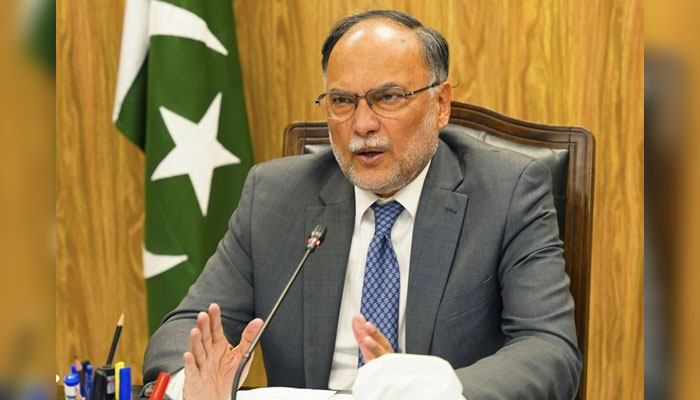‘Cross-border data vital for tackling climate change, pandemics’
Islamabad: Federal Minister for Planning & Development Ahsan Iqbal has said that cross-border data sharing was critical for tackling issues like climate change and pandemics.
Mr Ahsan was speaking at the “Data for Development (D4D) Symposium” organised here by Sustainable Development Policy Institute (SDPI) and United Nations Population Fund (UNFPA) partnering in implementing the country’s first D4D initiative.
The initiative aims to strengthen capacities of government departments — particularly those of planning and development — by promoting evidence-based development planning across the country with a special focus on provincial-level implementation.
The minister said achieving Sustainable Development Goals (SDGs) by 2030 required accurate, reliable and timely data, as 68 pc of the goals depend on it. However, he said, Pakistan faced significant challenges in this area.
“For instance, Pakistan Bureau of Statistics (PBS) recently highlighted a 22 pc gender gap in female school enrolment in the urban areas,” he said.
He said data had also enabled positive outcomes in Pakistan such as reducing electricity theft, ensuring targeted aid distribution through Benazir Income Support Programme (BISP), and predicting monsoons with 90% accuracy. He said that AI ethics frameworks and inclusive data systems were being prioritised to ensure fairness in decision-making adding that the decisions we make today about data governance and ethics will shape Pakistan’s future.
Shafqat Kakakhel, Chairperson, Board of Governors, SDPI, said there were many entities that contributed to successful and effective data systems. He said one of the major objectives of this symposium was to help stakeholders understand in greater detail what had been achieved through data.
Dr Sajid Amin Javed from SDPI said this programme emphasised planning based on accurate, effective and true data, unlike the unreliable data we had seen in the past. He said while UNFPA and SDPI would always support this project, the provinces need to take ownership and carry it forward.
UNFPA representative Dr Luay Shabaney said without transforming data into actionable knowledge, it is of limited value. D4D aims at translating data into knowledge that can guide decisions, he said, adding that there is no justification for investing public funds into data systems if they do not rationalise the decision-making process.
Muqaddar Shah, programme analyst-PD UNFPA, said for Pakistan, quality data was vital for decision-makers, particularly in tackling challenges like urbanisation, child labour and child mortality.
He said accessibility to and collection of high-quality data were key to better planning and development.
Balochistan Planning and Development Secretary Wali Mohammad Barech said data was the fuel for digitisation that leads to sound judgments which drive development. Every year, we see around 4,000 development schemes, yet replication and inefficiencies persist due to the lack of accurate data. For example, in Balochistan, we currently rely on GPS coordinates and geospatial data for resource allocation in remote areas. Without accurate data, rightful development is impossible, he said.
-
 Melissa Jon Hart Explains Rare Reason Behind Not Revisting Old Roles
Melissa Jon Hart Explains Rare Reason Behind Not Revisting Old Roles -
 Meghan Markle Eyeing On ‘Queen’ As Ultimate Goal
Meghan Markle Eyeing On ‘Queen’ As Ultimate Goal -
 Japan Elects Takaichi As First Woman Prime Minister After Sweeping Vote
Japan Elects Takaichi As First Woman Prime Minister After Sweeping Vote -
 Kate Middleton Insists She Would Never Undermine Queen Camilla
Kate Middleton Insists She Would Never Undermine Queen Camilla -
 King Charles 'terrified' Andrew's Scandal Will End His Reign
King Charles 'terrified' Andrew's Scandal Will End His Reign -
 Winter Olympics 2026: Lindsey Vonn’s Olympic Comeback Ends In Devastating Downhill Crash
Winter Olympics 2026: Lindsey Vonn’s Olympic Comeback Ends In Devastating Downhill Crash -
 Adrien Brody Opens Up About His Football Fandom Amid '2026 Super Bowl'
Adrien Brody Opens Up About His Football Fandom Amid '2026 Super Bowl' -
 Barbra Streisand's Obsession With Cloning Revealed
Barbra Streisand's Obsession With Cloning Revealed -
 What Did Olivia Colman Tell Her Husband About Her Gender?
What Did Olivia Colman Tell Her Husband About Her Gender? -
 'We Were Deceived': Noam Chomsky's Wife Regrets Epstein Association
'We Were Deceived': Noam Chomsky's Wife Regrets Epstein Association -
 Patriots' WAGs Slam Cardi B Amid Plans For Super Bowl Party: She Is 'attention-seeker'
Patriots' WAGs Slam Cardi B Amid Plans For Super Bowl Party: She Is 'attention-seeker' -
 Martha Stewart On Surviving Rigorous Times Amid Upcoming Memoir Release
Martha Stewart On Surviving Rigorous Times Amid Upcoming Memoir Release -
 Prince Harry Seen As Crucial To Monarchy’s Future Amid Andrew, Fergie Scandal
Prince Harry Seen As Crucial To Monarchy’s Future Amid Andrew, Fergie Scandal -
 Chris Robinson Spills The Beans On His, Kate Hudson's Son's Career Ambitions
Chris Robinson Spills The Beans On His, Kate Hudson's Son's Career Ambitions -
 18-month Old On Life-saving Medication Returned To ICE Detention
18-month Old On Life-saving Medication Returned To ICE Detention -
 Major Hollywood Stars Descend On 2026 Super Bowl's Exclusive Party
Major Hollywood Stars Descend On 2026 Super Bowl's Exclusive Party




